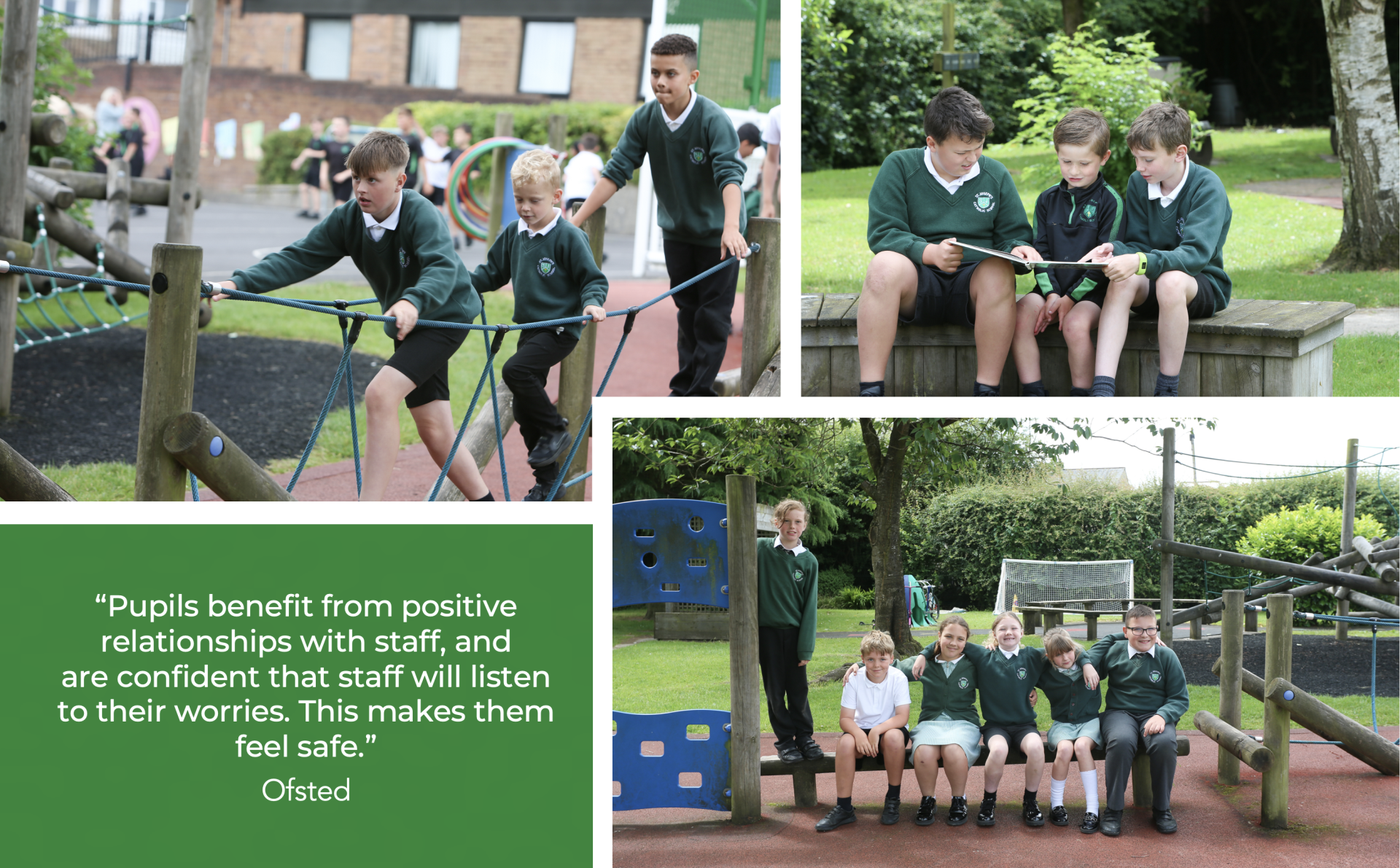Safeguarding and Child Protection
The Designated lead for our school is Mrs C Hargreaves and the Deputy Designated lead is Miss H Gill
The designated lead for Prevent and Children Looked After is Mrs C Hargreaves

We are a caring school with the welfare of all our pupils deeply entrenched in our philosophy. We have a duty of care to report any concerns to Social Services if deemed necessary by the Headteacher who is the person responsible for Child Protection.

Information will only be shared with the school by the police where it is identified that a young person was present, witnessed or was involved in a domestic abuse incident.
Mrs C Hargreaves and Miss H Gill are the Encompass Key Adults and have been trained to liaise with the police.
Mrs C Hargreaves is also the school Designated Safeguarding Lead (DSL). Miss Gill is our back up DSL. I will be able to use information that has been shared by the police, in confidence, to ensure that the school is able to make provision for possible difficulties experienced by children or their families. I will keep this information confidential, and will only share it on a need to know basis, for instance, to teaching staff for the child or young person. It will not be shared with other school pupils.
Operation Encompass was first introduced in Plymouth in February 2011, and has proved very effective in providing appropriate and timely support to young people affected by domestic abuse. This initiative has been implemented across the whole of the Lancashire Police area. If you would like some more information about it, you can view it online at www.operationencompass.org.
We are keen to offer the best support possible for our pupils and a recent review of Operation Encompass showed that it is beneficial and supportive for all those involved.
Operation Encompass Letter.pdf
Miss Gill is the school's Mental Health Champion and is fully trained to support pupils with their mental health.
We want to create a culture where mental health is treated as a normal part of life, in the same way as physical health and where every young person has access to support if they need it.
Early Help Information
What is Early Help?
Early Help means providing help for children and families as soon as problems start to emerge or where it is likely that issues will impact negatively on children’s outcomes.
Early Help…
- is for children of all ages and not just the very young,
- can be very effective in supporting a child, young person and/or their family to step down from statutory services as well as preventing the escalation of issues.
- is important because there is clear evidence that it results in better outcomes for children.
Lancashire County Council recognises that Early Help is a term that describes much of the everyday work of schools.
https://www.lancashire.gov.uk/practitioners/supporting-children-and-families/
Early Help in Lancashire
The vision of all partner organisations working with children and families in Lancashire is to improve children’s lives by working in partnership to raise aspirations, build achievement and protect the most vulnerable.
This is based on the belief that:
- Children, young people and families develop resilience if there are protective factors in place such as: a positive relationship with an adult; good literacy and communication skills; good school attendance; and, parents in or actively seeking/ready for work
- Children’s needs are best met when help is offered in a universal setting within a socially mixed group and early on when problems start to emerge
- Children and young people’s needs are best met when addressed in the context of the whole family, meaning that parents/carers/siblings’ needs are addressed with consent as part of a holistic and integrated Early Help response
Early Help services should support and strengthen families so that they can thrive.
We follow the Working Well with Children and Families Guidance
Lancashire CSAP (Children’s Safeguarding Assurance Partnership) website:
The CSAP website is full of useful safeguarding and CP information.
Your Family’s Early Help Assessment and family RADAR has replaced the CAF document.
Early Help Assessment – Section E – family radar
The Early Help Assessment and Plan features a family radar. The family radar is linked to the cycle of change and will help you to identify which areas of support the family need the most. By completing a family radar, we are trying to get the families you work with to understand at what point of the cycle of change they are at.
Early Help Assessment
On 6 September 2021 the Your Family’s Early Help Assessment replaced the Common Assessment Framework (CAF) across Lancashire.
The Early Help Assessment is an intervention with a family to gather, explore and analyse with them information about all aspects of the child or young person (and their family’s) life and then to identify areas where change will address support needs and positively impact on their lived experiences.
This is recorded on an Early Help Assessment form which includes the family’s Early Help Plan.
The Early Help Assessment is not a referral form for professionals to complete to access other services supporting children, young people and families. The Early Help Assessment should be completed by the professional supporting the family to identify the family’s unmet needs and develop a plan of support with the family.
Your Family’s Early Help Assessment is available to all practitioners and professionals working with children, young people, and their families across Lancashire.
Working alongside families from a holistic, strength-based approach when areas of support are first identified will stop escalation towards crisis and the need for more intensive and specialist intervention.
Through the Early Help Assessment, Plan, and reviews via Team Around the Family meetings the wider partnership of services can provide families with the right support at the right time.
Lancashire’s Children and Family Wellbeing Service-early help referrals
Lancashire County Council’s Early Help Offer Lancashire’s Children and Family Wellbeing Service (CFW) offers practical support to children, young people, parents/carers and families.
This support can be provided on a whole range of issues which may be affecting individuals or the family and is offered through a network of centres as well as in the community or in the family home. The main focus of the service is to provide an enhanced level of support which is prioritised towards those groups or individuals who have more complex or intensive needs or who are at risk and particularly where we think that providing early help will make a positive difference.
We want any problems to be identified early and appropriate support be put in place on a basis on mutual respect and sensitivity to the family. Any concerns and referrals are made via early help and by having parental consent for an early help assessment.
Lancashire Children’s Services Safeguarding Hub (MASH)-the single point of contact to support the child and family.
We use the Continuum of Need to establish the level of support needed.
https://www.lancashiresafeguarding.org.uk/resources/assessment-and-referral/
The Role of Schools
Day to Day Support
Most families, most of the time, can get on with their lives quite happily with little or no outside help. If they need help it is usually provided by universal services, such as schools.
Focused Pastoral Support
All families can have times, however, when difficulties arise and they either may not recognise it or may not know how to start putting things right. Schools play a role in supporting families to address these difficulties through more focused pastoral support, which might include bringing in support via an external agency.
Early Help Assessment
For those children and families whose needs and circumstances make them more vulnerable, or where schools need the support of other agencies to meet the needs of the family, a coordinated multi-agency approach is usually best. In Lancashire this is achieved through undertaking an Early Help Assessment and assigning a Lead Practitioner to work closely with the family to ensure they receive the support they require. Schools should be a key partner in any multi-agency work to support families.
The following five commitments are the core elements to St. Joseph's Catholic Primary School’s Early Help Offer.
By implementing these commitments Adlington Primary School aims to ensure:
- Pupils, parent/carers and staff are clear on the Early Help support available through the school
- Clarity for partners, supporting improved multi-agency working
- Delivery approaches of Early Help support for more vulnerable families are up to date with local offers
- Commitment to the personal development and well-being strand of the Ofsted Framework
- High quality pastoral support is at the heart of all that we do to help others.












